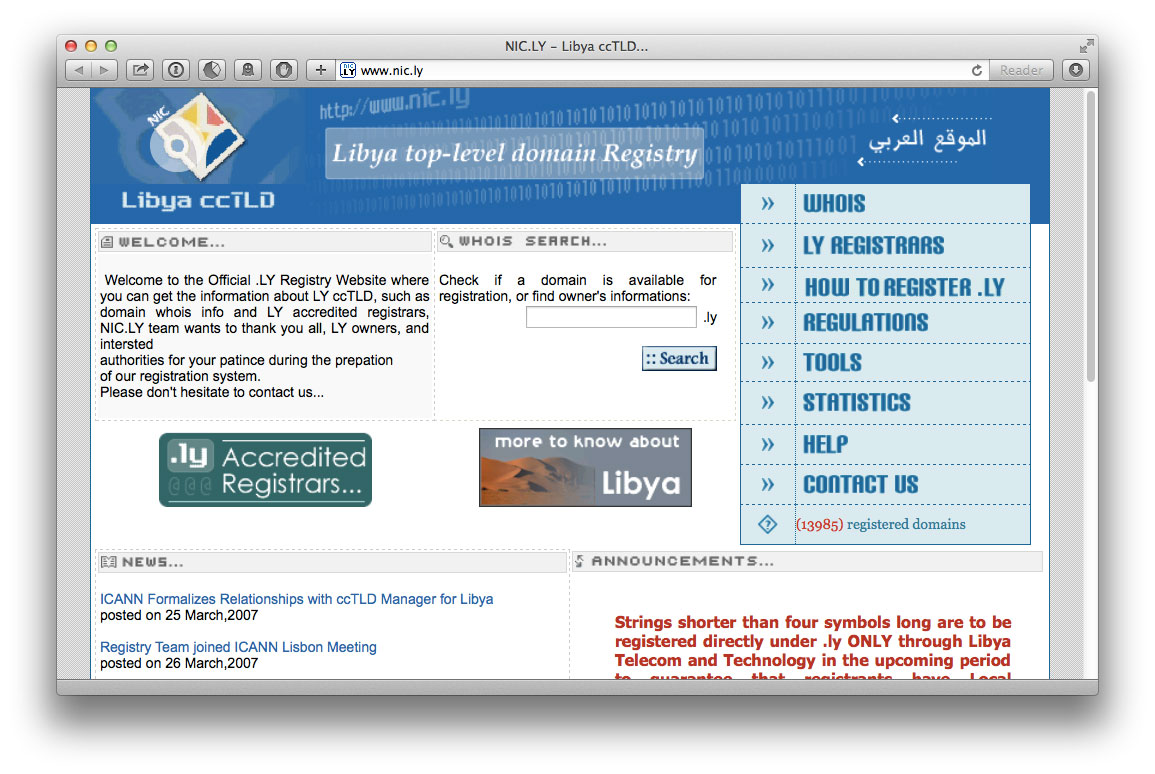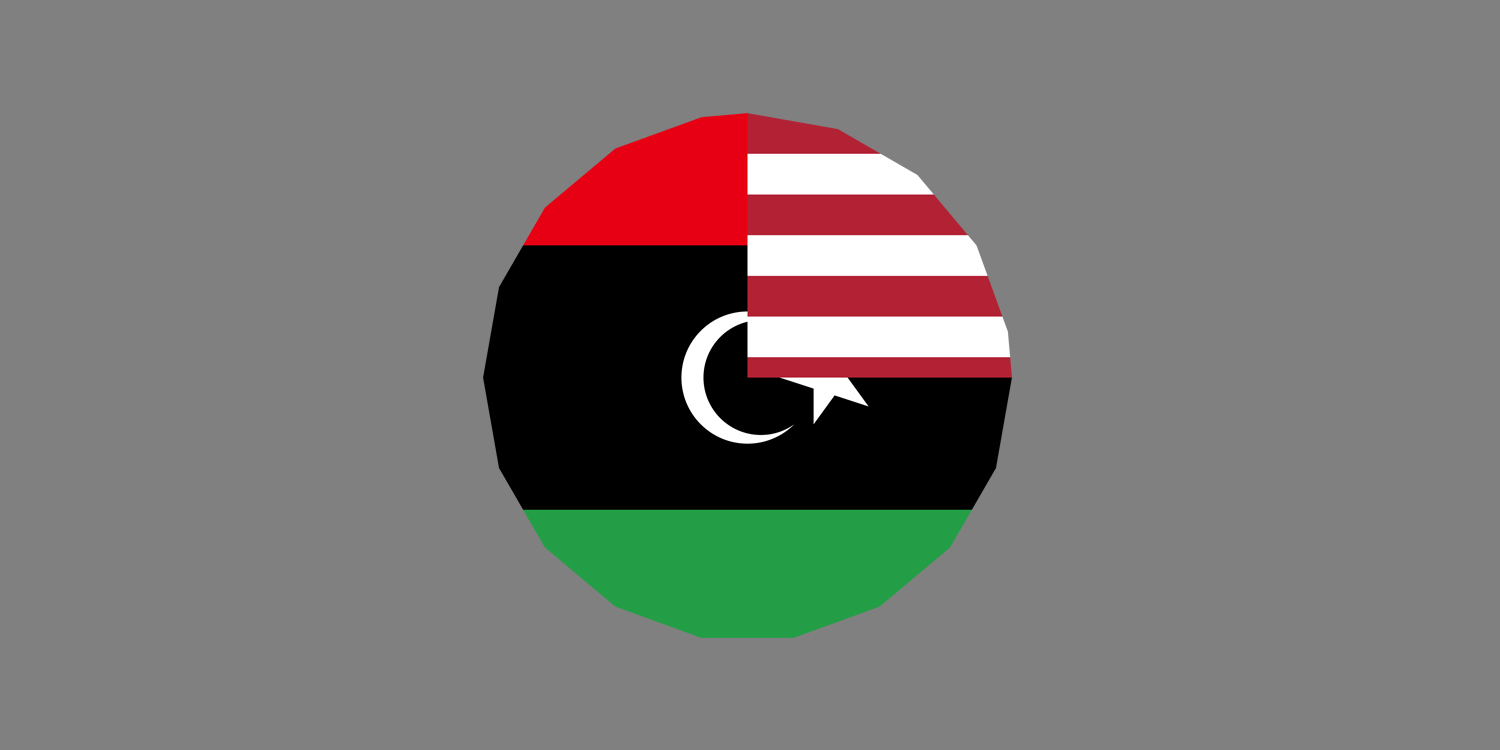The story of .ly, the country code top-level domain (ccTLD) for Libya, begins with a deception. In April 1997, someone called Kalil Elwiheshi applied to the Internet Assigned Names Authority (IANA) to take responsibility for the domain. At that time, the IANA was a small team run out of the University of Southern California by Jon Postel, which based its decisions on ISO country codes issued by the UN - and the goodwill of the internet community (see The Story of .scot for more on the history of IANA). But Elwiheshi was not acting in good faith, and supplied an address in Libya as the administrative contact for .ly, despite residing in the UK. For several years, Elwiheshi’s lydomains.com and another British company called Magic Moments sold, and kept the profits for, Libyan domains.
It wasn’t until 2004 that the situation came to a head. On the morning of April 7th, some 12,500 .ly domains - each costing their owners $500 to register - disappeared from the Internet. Lydomains had stopped serving up addresses, and all of the domains became inaccessible. It turned out that Magic Moments had disappeared some time before, following a 2002 complaint to ICANN, which is supposed to resolve domain name disputes. A few days later, with some but not all of the domains back online, an email from a Dr Hosni Tayeb was sent to domain holders, claiming to be the "caretaker" of the Libyan ccTLD. Tayeb had been presenting himself at internet meetings for several years, accompanied by documents which he claimed were an agreement with the Libyan government - but all in Arabic. The email, in poor English, told everyone not to worry: "Thank you very much for your concern about .ly cc TLD. People do care around!" Libyan Spider, a prominent Libyan hosting provider, posted a plaintive call: "Who runs .ly?" Nobody seemed to know.
In October, ICANN finally stepped in, and redelegated the .ly namespace directly to the Libyan government, in the form of the General Post and Telecommunication Company (GPTC), which administers all the country’s telecommunications services. The same year, international sanctions on Libya and the government of President Muammar Gaddafi were lifted. But the story of .ly has remained fraught ever since.

In October 2010, news sites across the internet carried the news that the Libyan government was revoking .ly domains, which it had been selling since 1988. Although expensive, .ly domains had become particularly popular for "domain hacks" (where the domain is used to spell out part of a site’s name, like sal.ly) and for URL shortening services (like bit.ly and ow.ly, which allow users to copy and paste short versions of long addresses). As a result of these services, huge amounts of traffic, particularly from social media, flow through .ly domains.
One of these services, vb.ly, had been deleted by the registry. vb.ly belonged to Violet Blue, a journalist and educator based in the United States, and described itself as a "sex-positive URL shortener." The site’s owners accused their hosts of enforcing Sharia law on the internet. Although it was almost certainly not the only .ly site to do so, by posting links to pornographic sites, vb.ly was in violation of the Libyan registrar’s Terms of Service. Pornography is illegal under Libyan law - which is not the same as Islamic law. Domains have a geography, and all of them must conform to the laws of the countries in which they are registered - if it's enforced. Violet Blue’s own response asked "Can we expect even, or uneven, enforcement of Libyan law and its moral laws on all .ly domains? Or just the one with the girl with the bare arms, and the words "sex positive" above her head?"
The fuss over vb.ly stained the reputation of .ly, giving it a reputation for insecurity, despite loud calls of support from some of its users. But far more serious threats to .ly domains and to Libyans themselves were to come.

On March 31 2011, Hadi Naser, CEO of Libyan Spider, came into work to discover all his domains were offline. He quickly discovered that the outage was deliberate: the US-based company which distributed all his content, Softlayer, had shut him down, apparently on orders from the US Government. In February, the mass arrest of human rights campaigners in the eastern city of Benghazi had sparked violent protests across the country; in March the UN Security Council authorised NATO air raids on the country. Naser, who taught himself to code while working at an auto spare parts shop, thought he was finished: "It’s hard for me to explain how those three days went for me. I had been working for 10 years and then someone comes and shuts down everything. Completely destroyed 10 years of work... For 3 days I wasn’t able to talk or act or move or think. It’s like if I die it would be better than this thing happening to me."
Eventually, a campaign by Libyan Spider’s international clients got Softlayer to relent - but like many Libyan businesses, Naser was forced to leave the country for a time to ensure those clients continued to receive service. For a time it looked like all the government’s websites would be shut down, and Naser and others pleaded with the GPTC to keep the sites going: "I was in contact with some good guys at GPTC and I reminded them of the contract they signed with ICANN, the agreement stated that GPTC has to maintain and serve .ly domains to the local and global community otherwise ICANN has the right to assign the .ly domain to different entity."
In August 2011 hackers broke into the website of nic.ly, the official government registrar, and defaced its homepage: "bye bye Qaddafi" they wrote, beneath the flag of the National Transitional Council, the then-dominant opposition. When the conflict broke out again in 2014, the Libyan internet continued to be part of the battleground.
Many towns and cities remain without internet connection and the situation is unlikely to improve soon. According to Khaled Esheh, Technical Consultant to Libya Telecom & Technology and Technical Manager of .ly, "Some areas don't have Internet now because it is difficult to send technicians to the areas of the conflict to repair the faulty equipment - most of the expansion projects are on hold now or moving slowly".
Even more difficult is the situation of the network infrastructure itself: "Unfortunately as there are two governments now in Libya, there is a dispute now over the ownership of the current domains which belong to the the government entities." Libya’s two governments, as well as other splinter groups, are competing over the ability to communicate officially via the internet, and in places it comes down simply to who holds the login details: "the government domains are distributed between the two parties and it depends on who has the password which allows them to change the details of the domain."
One solution is to move the registry out of the country, which LTT and others are working on. A full back-up is difficult however, as due to the domain’s fractious history, not all of the records are held by a single administrator. But it’s unlikely that reliable internet will be returning to Libya any time soon, and so its engineers are being forced once more to look abroad, separating the Libyan people from their own internet territory once again.
I'd like to thank Khaled Esheh and Hadi Naser for their invaluable help in preparing this essay. Libyan Spider has recently launched a number of web and app online guides to Libya: check them out at Guide.ly.